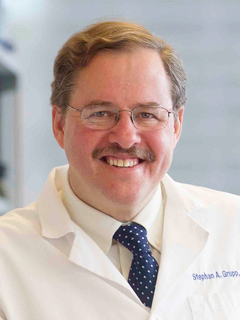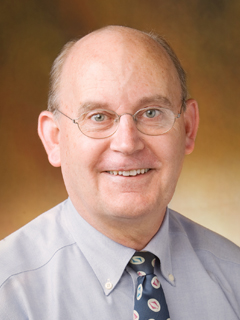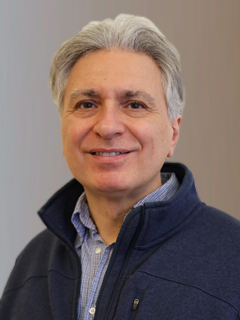HOW CAN WE HELP YOU? Call 1-800-TRY-CHOP
In This Section
Dr. Evans’ Legacy, Fellows of the AACR Academy, Novel Gene Therapy Approach for MLD

One of Children's Hospital of Philadelphia's original breakthrough makers, Audrey Evans, MD, is honored in a biopic about her life and foundational work in neuroblastoma. We also celebrate the election of Garrett Brodeur, MD, and Stephan Grupp, MD, PhD, as Fellows of the American Association for Cancer Research (AACR) for their lasting impact on cancer research. And we're featuring a novel gene therapy approach that has the potential to improve treatment for the rare and debilitating pediatric disease, metachromatic leukodystrophy. This and more In The News.
Trailblazing Oncologist Dr. Audrey Evans Immortalized in Biopic

Audrey Evans, MD
CHOP's research community anticipates the March 28 release of Audrey's Children, a feature film that tells the story of Dr. Evans, CHOP's first Chief of the Division of Oncology. Known as the "Mother of Neuroblastoma," Dr. Evans led innovative research, clinical care, and treatment for children with this rare form of cancer. She understood the importance of holistic care for patients and their families, and she co-founded the first Ronald McDonald House in 1974 to provide a respite space for families of hospitalized children.
Dr. Evans' staging system for neuroblastoma revolutionized diagnosis and treatment for the disease. World-renowned Pediatric Oncologist John Maris, MD, the Guilio D'Angio Chair in Neuroblastoma Research at CHOP, had the opportunity to learn from Dr. Evans.
"She was a driving force in leading the revolution that changed childhood cancer from being a nearly uniformly fatal disease, to one where we cure 80% of patients," Dr. Maris said.
The movie honors Dr. Evans' legacy at CHOP, and its release comes during the month she would have celebrated her 100th birthday.
Learn more about Dr. Evans' trailblazing career and watch the movie trailer. Visit the Audrey's Children website for showtimes and tickets.
Innovative CHOP Cancer Researchers Elected to AACR Academy's 2025 Class of Fellows
CHOP cancer researchers Garrett Brodeur, MD, and Stephan Grupp, MD, PhD, are among the distinguished scientists elected as Fellows of the American Association for Cancer Research Academy Class of 2025. Each year, the AACR Academy recognizes and honors extraordinary scientists whose groundbreaking contributions have driven significant innovation and progress in the fight against cancer.
Dr. Grupp, Section Chief of the Cellular Therapy and Transplant Section, Inaugural Director of the Susan S. and Stephen P. Kelly Center for Cancer Immunotherapy, and Director of Translational Research in the Center for Childhood Cancer Research at CHOP, is being recognized for exemplary research efforts leading to the development of CAR T-cell therapy for pediatric patients.
His contributions helped to revolutionize personalized cancer treatment and led to the FDA approval of tisagenlecleucel (Kymriah®, Novartis) for B-cell acute lymphoblastic leukemia, the first CAR T-cell and gene therapy approved for use in patients.
Dr. Grupp holds the Yetta Deitch Novotny Endowed Chair in Pediatric Oncology at CHOP and is Professor of Pediatrics in the Perelman School of Medicine at the University of Pennsylvania.
Dr. Brodeur, Director of the Cancer Predisposition Program at CHOP, received recognition for his invaluable contributions to neuroblastoma research, such as identifying MYCN amplification as a marker of high-risk disease and developing a novel multivalent nanomedicine (PEEL-24) that is more effective and less toxic than its conventional counterpart, irinotecan. Additionally, he worked on the preclinical development of tropomyosin receptor kinase (TRK) inhibitors, a class of targeted cancer drugs that inhibit the activity of TRK proteins, for pediatric solid tumors.
He also led efforts to develop the first International Neuroblastoma Staging System and Risk Grouping that incorporates molecular markers and has organized pioneering international workshops on pediatric cancer predisposition and surveillance.
Dr. Brodeur holds the Audrey E. Evans Endowed Chair in Pediatric Oncology and is a Professor of Pediatrics at Penn.
Drs. Brodeur and Grupp will be formally inducted with their fellow Class of 2025 members at the AACR Annual Meeting, April 25-30, in Chicago.
Read more in this CHOP news release.
Social and Healthcare Inequities Associated with Recurring Violent Injury in Children
CHOP researchers in the Center for Violence Prevention (CVP) at CHOP conducted a retrospective study that found that children living in areas with the lowest Child Opportunity Index (COI), were more than twice as likely to experience another violent injury within a year of an initial firearm-related emergency department visit. This work, a collaboration with Lurie Children's Hospital in Chicago, also found that social inequities were associated with violent reinjury.
"Hospital-based violence prevention programs, which provide wraparound care and social support for injured children, could be expanded to help reduce reinjury risks," said Joel Fein, MD, MPH, Co-director of the CVP and one of the study authors. "Addressing structural and social drivers of health is essential for long-term progress in preventing firearm injures among children."
Researchers analyzed data from 6,681 children treated for firearm injuries at one of 49 U.S. pediatric hospitals between 2016 and 2023. Of these children, 116 (1.7%) experienced another violent injury within one year. The data showed that adolescents 15-16 years old, non-Hispanic Black children, and children who lived in urban areas were at higher risk for reinjury. About 52 percent of reinjured children lived in a community with the lowest COI, a measure that assesses factors like education, socioeconomic resources, and access to health environments.
The study authors suggest that healthcare providers consider integrating COI data into patient assessments to identify and support those at the highest risk.
JAMA Pediatrics published the study. Learn more in this CHOP news release.
Preclinical Study Findings Suggest Novel Gene Therapy Could Improve Metachromatic Leukodystrophy Treatment
In a preclinical study, researchers in the Rivella Laboratory, the Division of Neurology, and the Leukodystrophy Center at CHOP, demonstrated a novel gene therapy that potentially increased effectiveness and safety for the treatment for metachromatic leukodystrophy (MLD).
MLD is a rare disease in which young children patients lack a properly functioning arylsulfatase A (ARSA) enzyme. This enzyme deficiency prevents the breakdown of sulfatides that help maintain healthy nerve function. Without effective treatment, MLD leads to a rapid, progressive decline in neurological skills and is potentially fatal.
The current Food and Drug Administration-approved gene therapy for MLD introduces a functional ARSA gene into a patient's hematopoietic stem cells with the goal of fixing the genetic problem. However, not all patients are eligible, leaving many unable to receive the transformative treatment, including children with the late juvenile form of the disease.
Stefano Rivella, PhD, a senior study author and research faculty member in the Division of Hematology, and his team opted to explore how newer vectors enable immune cells to produce the missing enzyme at higher levels, which may improve safety and efficacy and potentially decrease cost. Using novel lentiviral vectors, the scientists increased the production of ARSA cellular DNA at single integration, optimizing ARSA gene expression and enhancing safety.
"Combining autologous hematopoietic stem cell transplant with a more powerful lentiviral-based gene therapy has a greater potential to treat different manifestations of MLD," said Lucas Tricoli, PhD, first study author and a Research Associate Scientist at CHOP. "We've shown that achieving the optimal balance between high enzyme production for therapeutic efficacy and maintaining a low vector copy number is essential, in order to maximize the clinical benefit while minimizing risks and costs."
The research team is currently in the process of applying for an Investigational New Drug application with the FDA to start a new trial to confirm safety and efficacy in human patients.
Additional study collaborators from CHOP include Adeline Vanderver, MD; Rebecca Ahrens-Nicklas, MD, PhD; Laura Adang, MD, PhD; Peter Kurre, MD; Sunetra Sase, PhD; and Frederic Bushman, PhD.
Molecular Therapy Nucleic Acids published the findings. Learn more in this CHOP news release.
ICYMI
Catch up on our headlines from our March 7 In The News:
- CHOP Researchers Named 'Disruptors of the Year' for Sickle Cell Disease
- Vote for Hemophilia A Gene Therapy Research in 2025 STAT Madness
- CHOP and Penn Medicine Host Inaugural Synovial Sarcoma Conference
- Ongoing Clinical Trial Supports Exa-Cel as Potential Durable Treatment for SCD
- Analysis of Trial Results Informs Interventions for Patients with Cardiac Disease
- Early-life Sun Exposure Associated with Lower Risk of Relapse in Pediatric-onset MS
Keep up with our news, stories, and updates in real time by following us on X, Facebook, LinkedIn, or Instagram. Meet the minds behind the science in the Bench to Bedside podcast. Or subscribe to our newsletter to receive an email every other Friday.





